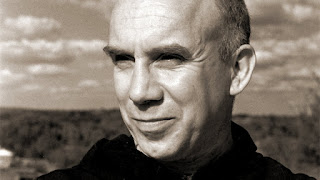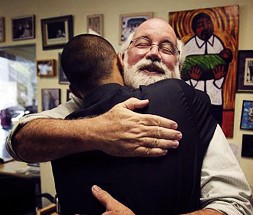The logic of the Bible’s mystical, confusing
and even conflicting accounts of Jesus’ resurrection is that he’s vindicated,
he really is who people doubted he was. What’s the preacher’s task here? As is
usually the case, the text isn’t about us. It’s about Jesus! Sermons would do
well just to lavish attention on Jesus and how amazing he was and is and will
be. The takeaway? The moral? No need for either, although takeaways and morals
and such can unfold without the preacher inducing them or making them obvious.
You have to decide if it’s “you” to try to address what actually happened. Easy, and maybe important, to say I really believe he physically rose! The pious will adore you, skeptics might lean in, or push back. Amy-Jill Levine probably is spot on in saying historical arguments are unhelpful: “It’s like trying to talk someone into or out of love.” The brilliant commentator Dale Allison has a new book out on the resurrection. He parses with exegetical care every text, and examines all kinds of hallucinations and visions through Christian history – and in other religions. His conclusion (spoiler alert?) is the tomb was found to be empty, cause unascertainable. Afterward, individuals and groups swore they experienced him. For Allison, it’s visionary – like Paul’s meeting with the risen Christ, or Julian of Norwich’s. Jesus, after all, sort of materializes and then vanishes. Did God do it this way? Or is it different because Jesus was different? Issues – for the preacher internally if not for the people. Is Easter a time to open up such quandaries??
My previous blog from a previous Easter has good illustrative material. Some interesting details we find in Luke: it’s a “deep dawn” (orthrou batheos) that the discovery unfolds. Thomas Merton spoke of rising before dawn at the Gethsamani Abbey: “It is necessary for me to see the first point of light that begins to be dawn. It is necessary to be present alone a the resurrection of Day in solemn silence at which the sun appears, for at this moment all the affairs of cities, governments or war departments are seen to be the bickering of mice. I receive from the eastern woods, the tall oaks, the one word DAY.”
They “found” the tomb empty: the verb, eurisko, is like Eureka! Same verb as
the one Luke employed describing what the shepherds found in Bethlehem. Luke
alone notices that the women weren’t credible witnesses in the eyes of the male
disciples. There’s a counter-cultural tone here – although we might wish Luke
had gone further in Acts and noted the women might have been the best
candidates to succeed Judas as among the twelve! Then eleven didn’t believe –
the story? Or the women? Or both?
My ambivalence about Easter, the bigness of it and yet the flowers and pretty dresses, the throngs appearing we’ve not seen since Christmas Eve, gets redeemed when the organist (and at our place, the brass and percussion) strike up the opening chords of “Christ the Lord is Risen Today.” Here are my reflections on this great hymn in my new book, Unrevealed Until Its Season:
I know it’s coming, but my knees buckle a
little, and I sense the tears welling up, which I try to choke back. Tears of
joy, yes. Tears of some sorrow, thinking of those I’ve loved and lost who used
to join us Easter Sunday morning but are no more.
Just as at Christmas we invoke “Sing, choirs
of angels… Sing, all ye citizens of heaven above,” we realize quite a multitude
beyond the crowd in the room is joining us in praise: “Sons of men and angels
say… Sing, ye heavens and earth reply.” Charles Wesley missed the inclusion of
women, but he did fathom that Easter isn’t merely humanity gaining entrance
into heaven. The whole earth is caught up in the redemption; “Love’s redeeming
work” is about the restoration of the entirety of God’s creation.
Yes, there are forces still at work battling
against life. But “Death in vain forbids him rise,” reminding us not only of
the seeming finality of our mortality but also the detail of soldiers posted by
Pilate at Jesus’ tomb – to be sure he stayed in there! Futile, trying to box in
the living God. Wesley’s hymn shares in Paul’s sarcastic mockery of death:
“Where, O death, is now thy sting?” “Where’s thy victory, boasting grave?”
We’re allowed this moment of cocky jubilation at the expense of what otherwise
would be our most insidious foe.
My favorite line in the hymn dawns when we sing the fourth and final stanza. I love the thought, and also that our sopranos punctuate the moment with a thrilling descant to unspeakably high notes. “Soar we now where Christ has led… Ours the cross, the grave, the skies.” We plodding, earth-bound people just don’t think in such elevated ways all that often. Even in church. Søren Kierkegaard, the nineteenth century Danish philosopher, devised a parable about church for geese. Imagining that they speak, and go to worship, Kierkegaard imagined that they would waddle into the sanctuary. A gander would preach on “the glorious destiny of geese, of the noble end for which their maker had created them,” namely “to use their wings to fly away to distant pastures.” The geese all clucked and curtsied with glee. But when the service ended, “they all waddled home, only to meet again next Sunday and waddle off home again.” Over time, of course, they “grew fat, plump and delicious” – and got eaten.
Kierkegaard explained his self-evident
parable: “We too have wings, we have imagination, intended to help us actually
rise aloft. But we allow our imagination to amuse itself in an hour of Sunday
daydreaming. In reality, however, we stay right where we are – and on Monday
regard it as proof that God’s grace gets us plump, fat, delicate. That is, we
accumulate money, get to be a somebody in the world, become successful and so
forth.” Isn’t it our greatest plight, that we say we believe in the
resurrection, we worship on Easter – and yet we waddle around as if nothing has
changed? It’s not enough to wait to soar up from the grave after death. We sing
“Soar we now.” Now.
And the verb “soar” has a connotation of
nobility. It’s not just going way up, but doing so in a majestic way. And there
is another hint in the word that the bird that soars does so without flapping
its wings, so high, so grand, so sublime is this soaring, almost effortless, as
if resting loftily above it all. I wonder what Jesus felt in his body the
morning of Easter. Did he feel… lighter?
I wonder, after the exhaustion of Holy Week,
the crowds from Palm Sunday, commuting the miles to and from Bethany each
evening and morning, purging the temple, teaching, the Passover, praying in the
garden, his arrest, being beaten and then gruesomely killed, if his mind
drifted to words he would have learned from his mother and heard in synagogue:
“Why do you say… O Israel, ‘My way is hid from the Lord, and my right is
disregarded by my God’? Have you not known? Have you not heard? The Lord is the
everlasting God, the Creator of the ends of the earth. He does not faint or
grow weary… Even youths shall faint and be weary, and young men shall fall
exhausted; but they who wait for the Lord shall renew their strength, they
shall mount up with wings like eagles, they shall run and not be weary, they
shall walk and not faint” (Isa. 40:27-31).










































